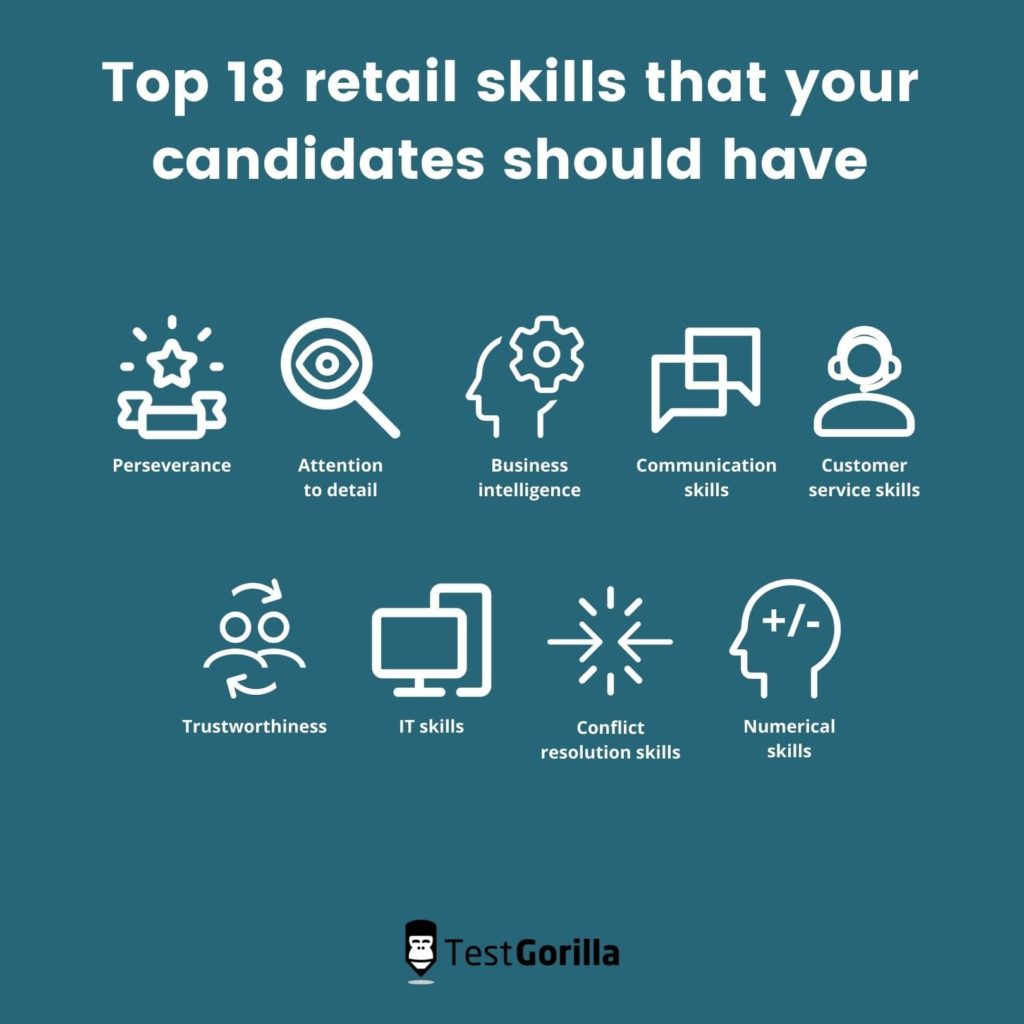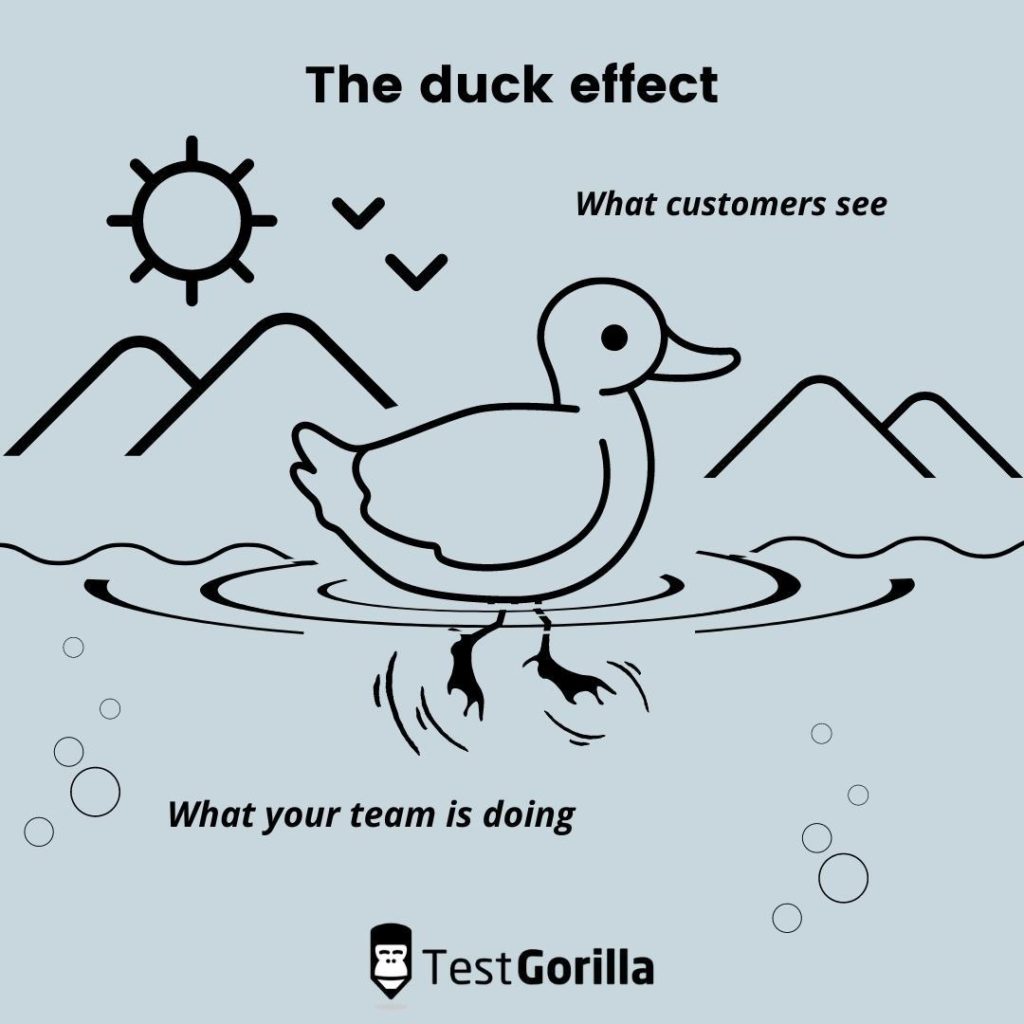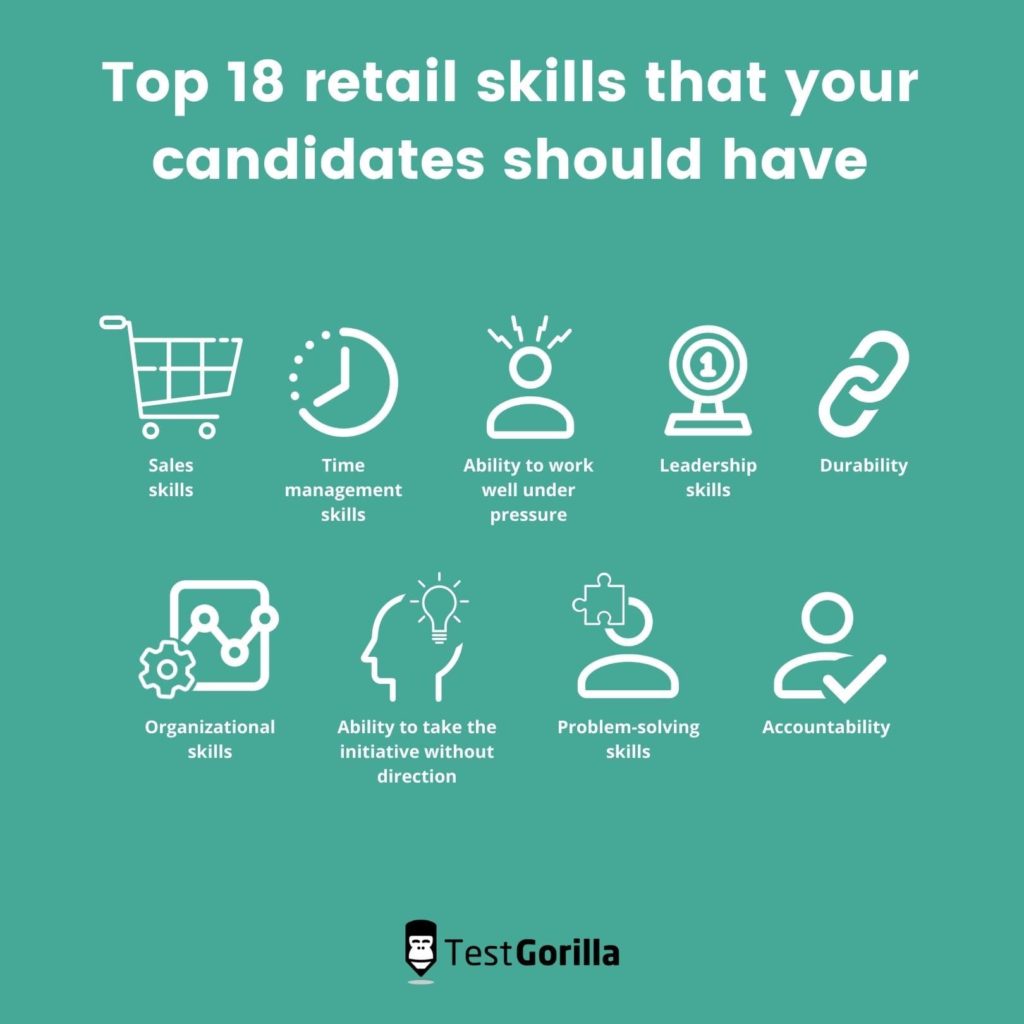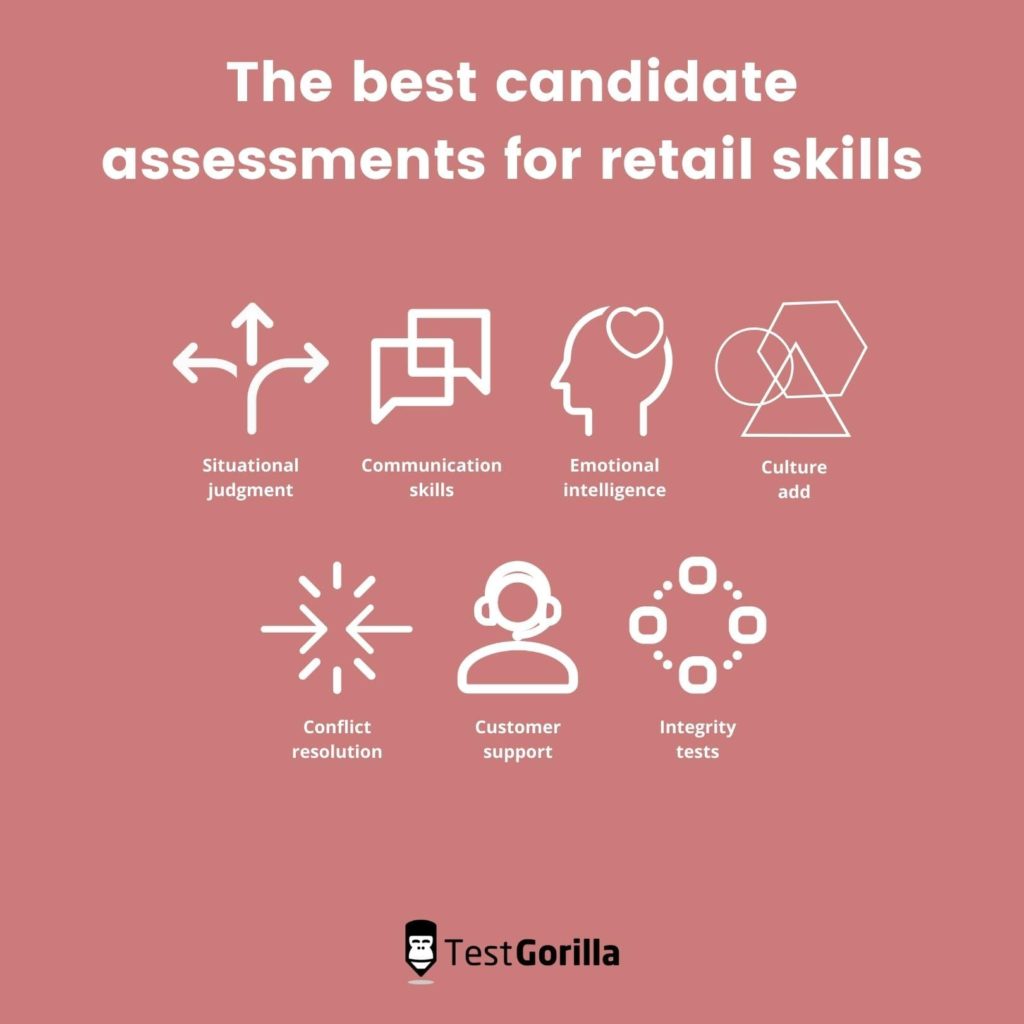18 retail skills candidates should have (and how to test for them)
Retail is the sale of goods to customers in a small quantity, usually for consumption rather than resale.
Malls, shops, and stores are all part of the retail sector, and the employees who work there need to have a certain skill set to be able to sell goods to customers and provide high-quality service.
What are the top retail skills that every candidate should have?
Retail jobs are high-pressure positions that require employees who can serve customers, increase sales, and provide a good customer experience.
The top 18 retail skills that your candidates should have are the following:
Perseverance
Attention to detail
Business intelligence
Communication skills
Customer service skills
Trustworthiness
IT skills
Conflict resolution skills
Numerical skills
Sales skills
Time management skills
Ability to work well under pressure
Leadership skills
Durability
Organizational skills
Ability to take the initiative without direction
Problem-solving skills
Accountability
In this article, we will explore why these skills are important in retail and how to test for them so that you hire the most qualified candidates.
What are the top retail skills?
Your candidates for retail jobs should display the following skills:
1. Perseverance
Retail isn’t an easy job—employees need to walk a thin line between being helpful and supportive to customers and pushing for a sale. A great candidate should display perseverance and work ethic when working in retail, and they should try to close the sale by helping the customer pick the best product/service for them.
2. Attention to detail
Retail workers need to be detail-oriented. This means being aware of what’s going on in the shop and noticing any shortcomings, minor problems with the products displayed, or a customer who clearly needs help but is hesitant to ask for it. A good retail employee needs to be detail-oriented to close more sales and increase profits for the company and the store.
3. Business intelligence
Candidates who want to work in retail need to have a business “sixth sense” and understand how the business operates. This means that they need to have extensive knowledge about the product, understand who the ideal customer is, know how to approach them, and have a clear vision of how to sell the product to the customer.
The greater the employee’s understanding, the easier it will be for them to make the sale, provide a good customer experience, and ensure that the business keeps on profiting.
4. Communication skills
A great retail employee will know how to communicate with his peers and managers in the shop, as well as with the customers who come to the store.
They will understand the concept behind the “duck effect.” In a well-functioning store, it appears to customers that everything is flowing smoothly, easily, and without any hiccups. But in the background, you and your team are actually working hard to maintain that perception (just as a duck flaps its legs underwater but doesn’t appear to be doing anything from above the water’s surface).
A retail candidate will need to know how to communicate respectfully to candidates. Additionally, they should be aware of when and how to provide feedback to their team members and also be willing to receive feedback to improve their own skills.
5. Customer service skills
The customer is always right—that’s the hallmark of many of today’s successful retail stores. Great customer service can be your unique value proposition in saturated markets, and the better your service is, the more the customers will come back and buy again from your store.
Companies like The Ritz-Carlton and Zappos have built their entire brands on their impeccable customer support.
6. Trustworthiness
Your retail employees work directly with your customers, so you need to have trustworthy people who can represent your company in the right way. This doesn’t just mean representing your company’s brand—your employees are often the first thing that your customers see and interact with when they want to buy your product. This makes retail employees the lifeblood of your company, as they are the frontline workers who make or break your business.
7. IT skills
Digital transformation has impacted every facet of today’s business operations, and retail isn’t an exception. Technology has impacted everything from feedback systems that companies use to garner feedback from customers to the way products are presented.
This means your retail employees need to be up to date with technology, know how to use it, and improve their sales and presentation skills by using tech and apps.
8. Conflict resolution skills
The question isn’t if problems will occur but when—and how your employees will handle them. Will they “pull a Dale Carnegie” and create a friend in the process, or will they behave in a way that will spiral the conflict out of proportion? Conflict resolution skills are a must-have for retail employees not only because they can be useful for calming down a frustrated customer but also because they will help them handle problems affecting their colleagues.
9. Numerical skills
Numeracy is yet another critical skill in retail. Your employees will need to be able to add up discounts on products, calculate prices on the spot, count inventory, give change to your customers, and perform other tasks involving numbers.
Retail managers should possess Excel competency, too, to ensure they can accurately analyze and interpret numerical store data. Cash management and cash accountability skills are essential, and your employees will need to be able to work well with numbers if they want to be successful retail workers.
10. Sales skills
Every retail employee will have at least one metric in their measure of success that’s related to sales. It’s one of the most crucial skills for any retail employee. Good sales skills will allow the employee to sell more goods, accomplish sales goals, advise customers, explain the benefits of a product, create rapport, and close sales.
11. Time management skills
A good retail employee will need to know how to manage their time. Time management skills help employees accomplish the following:
Be on time for their shifts
Understand how much time to spend with a single customer
Know how to use time management software
Follow the schedule laid out in the employee scheduling software
12. Ability to work well under pressure
Retail employees need to be able to work well under pressure. There will be plenty of dates during the year when a “swarm” of customers will come to your store, such as on Black Friday or throughout the Christmas season. During these times, your employees will need to handle a large number of customers in a short amount of time.
Therefore, your retail employees will need to be able to work well under pressure, not crack under it, and manage their expectations to provide the best possible service with a smile on their faces.
13. Leadership skills
Whether you’re hiring for a retail manager or a retail employee, leadership skills are a major differentiator. Leadership skills will benefit employees greatly during hard and stressful times at the store. A retail manager needs leadership skills to lead their team members by example and motivate them to achieve the set goals.
14. Durability
Working in retail often involves long hours and changing shifts, which require dedication from employees for quite a long time. Not to mention that the retail jobs themselves require employees to stand most of the time and interact with the customers as if they are at rest. That’s why durability is an important trait for all retail employees.
15. Organizational skills
Retail employees need to be organized if they want to be successful at their job. Organizational skills will help retail workers deal with inventory, manage cash, handle scheduling, and successfully multitask.
16. Ability to take the initiative without direction
Retail employees have quite a lot of autonomy on the shop’s floor, and they need to show initiative when dealing with problems and customers. They can’t just wait around for the manager to tell them what to do—they need to be proactive and serve the customer (and the store) in the best way possible.
17. Problem-solving skills
Your employees will inevitably face problems in the store, whether they are with a product, a customer, colleagues, or a manager. And they will need to figure out how to solve these problems as soon as possible to achieve the best possible outcomes.
That’s why problem-solving is such a valuable skill when it comes to retail employees.
18. Accountability
Retail workers need to be responsible and accountable. First of all, they need to be accountable to your company’s values, mission, vision, and brand and represent them in the best possible way.
Secondly, they need to be respectful to customers to close sales in order to take accountability for their jobs and your company’s success.
The best insights on HR and recruitment, delivered to your inbox.
Biweekly updates. No spam. Unsubscribe any time.
The best candidate assessments for retail skills
Your candidates must have the 18 retail skills described above. Did you know that skills-based hiring is ideal for these job roles? We have many pre-employment tests to help you hire retail staff with these essential retail skills.
1. Situational judgment
Your retail employees need to have great situational judgment to work at your store. Skills such as negotiation, leadership skills, and business ethics fall under the situational judgment umbrella.
The tests you should give to your candidates to evaluate their situational judgment are:
2. Communication skills
Your retail employees need to be able to communicate with customers, peers, and managers in a respectful way that will solve problems. It is critical for them to have skills in communication, problem-solving, and customer service.
Use these tests to assess your candidates’ communication skills:
3. Emotional intelligence
Employees working in retail need to be aware of their environment and people’s emotional states so that they can navigate through them to close sales, solve problems, and resolve conflict.
The following tests will give you a sense of your candidates’ emotional intelligence:
4. Culture add
An employee needs to have the crucial skills required to work in retail, but they also need to have the right values so that they can be integrated into your company’s workplace.
You can use these tests to find out if a candidate will benefit your company culture:
5. Conflict resolution
Retail employees need to know how to resolve conflict, whether it involves a customer or a member of their own team.
Evaluate your candidates’ conflict resolution skills using the following tests:
6. Customer support
Retail employees work on the shop’s floor and interact with customers daily. With that in mind, here are the tests you should give to your candidates to evaluate their customer support skills:
7. Integrity tests
Though retail employees work directly with your customers, they are also in charge of your inventory and cash, so they need to have integrity and strong ethics.
Give your candidates these tests to assess their integrity:
Using TestGorilla to hire candidates with strong retail skills
Your retail employees will need to have the right skill set to be successful in their jobs. That’s why you should use pre-employment tests to make sure candidates are the right fit for your retail business.
Pre-employment tests help you decrease time-to-hire, improve your hiring process, quickly remove unqualified candidates from the process, and accurately evaluate your candidates’ skills.
Here are just a few of the benefits of TestGorilla’s tests:
They are made by a subject-matter expert. Our tests are created by a subject-matter expert, and then another subject-matter expert evaluates the tests to improve them. Afterward, they go through multiple feedback and revision rounds, and only then do we put them up on our Test Library.
They provide objective scores. The results from our tests are objective and bias-free. All of your candidates get ranked on the same scale, making it easier for you to compare them.
You can set up video responses. Our platform allows customization of tests, including the option to add video responses and have your candidates shoot a video. This can help you see their camera presence, communication skills, and charisma.
Find and test the candidates with the best retail skills
Your retail employees will talk with your customers on a daily basis. You need to know how to evaluate your candidates to ensure they have the top 18 retail skills they’ll need to close sales and represent your business well.
This is where pre-employment tests can help you—TestGorilla gives you the option to choose from more than 170 scientifically-based tests that help you objectively evaluate your candidates without bias so that you can hire the best possible retail employees. Get started for free today and start making better hiring decisions, faster and bias-free.
You've scrolled this far
Why not try TestGorilla for free, and see what happens when you put skills first.






















